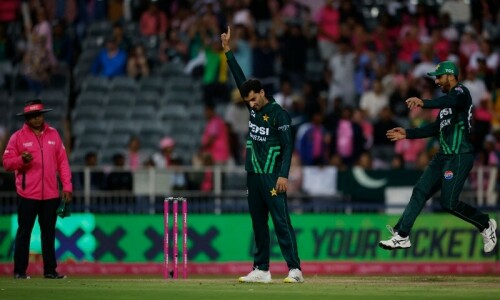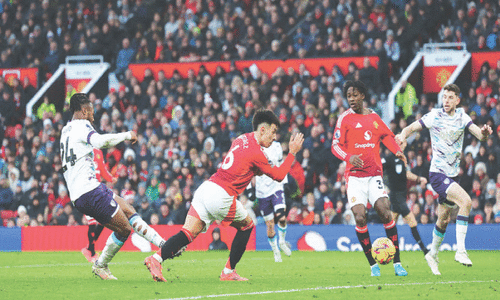ALMOST seven years after the spot-fixing scam at the Lord’s Test of 2010, when then Pakistan captain Salman Butt, Mohammad Asif and Mohammad Amir were exposed to the world for cheating and were later imprisoned to serve time, the controversy has raised its ugly head again during the on-going PSL and a lot more may come out of this Pandora’s box before the league is over.
The threat of this happening has always been on the cards since the incidents of such nature have already been made public during the corrupted IPL, BPL and the Sri Lankan T20 league.
Players were apprehended, banned and fined. Even teams were made redundant for similar offences in the IPL. So PSL which have had an untarnished first edition, has also now joined the league after the PCB anti-corruption unit got hold of Sharjeel Khan, Khalid Latif and their facilitator - discarded Pakistan player Nasir Jamshed - for allegedly having their hands in the till.
The news of them being sent back home on the second day of the PSL spread like wildfire within the Dubai Stadium and in the media box where I was as a guest of Jamal Mir of Prestige for four days in connection of filming of Quetta Gladiators promo for the team’s new sponsors.
For sponsors of the game and the teams this sort of negative publicity do them no good but a lot of harm and Islamabad United, the last year champions, have been worst hit by the row.
Trust in the players and in teams is of paramount importance for the followers of the game and if incidents of such nature are not controlled the game will suffer and so will its followers.
It did not surprise me though that this has happened once again involving Pakistan players, and that too after the chaos that rocked Pakistan cricket during their 2010 tour to England.
Unfortunately, cricket and gambling go hand in hand. The game’s popularity in England rocketed sky high right from the eighteenth century onwards when lords and ladies in England waged huge sums to gamble on the game and its players because of the choices they had.
The game’s popularity made cricket an ideal sport for the gamblers. And it is documented in the annals of the game that one Lord Beauklerk, a Hampshire cricketer, was banned from Lord’s cricket ground for match-fixing and one William Lambert, a Sussex batsman, was banned for illegal wheeling and dealing in as far back as 1820.
Lord Beauklerk was later made the MCC president.
Lord Tennyson, the MCC captain on the 1936-37 tour to India, was a compulsive gambler. His England team also played at Karachi Gymkhana in 1937 where he scored his last first-class century along with Bill Edrich against Sindh.
At a time when he lost his assets while gambling on cricket and racing, he headed to Hatton Gardens, in the jewelers district, to sell his gold medal given to him on that Indian tour. To his horror he discovered that the medal given to him in Bombay was of copper. The Indians had clearly cheated him.
In modern times, though, betting on the game has become legal in countries such as England, Australia, South Africa but remains illegal in India, Pakistan, Bangladesh and few other places.
The reason why approaches are made to players and teams from the hub of the trade near Mumbai Stock Exchange and Dubai where agents in the guise of few corrupt journalists and players’ agents prey on players and officials hoping to make a quick buck.
This never ending curse of spot-fixing will continue to embarrass people and organizations but it has always been difficult to eradicate the menace fully. A watchful eye and scrutiny of players on regular basis need to be put in place on the movement of those involved in the game.
Sharjeel, Khalid, Jamshed and other suspects should have learnt from the mistakes made by Salman Butt and company to keep themselves away from suspicious characters hanging around in the vicinity of their hotel and in the lobbies.
Easy money has magnetic effect and the greedy ones fall for it not knowing the consequences and then have to pay the price that they deserve.
The PCB anti-corruption needs to be appreciated for what they have discovered to put their hands on the suspects.
A fair hearing is what is most important, too, to get to the depth of it to punish the offenders no matter who is involved. A softy-softy approach is just not required here. If found guilty they should be handed a punishment that they deserve.
Published in Dawn February 19th, 2017












































